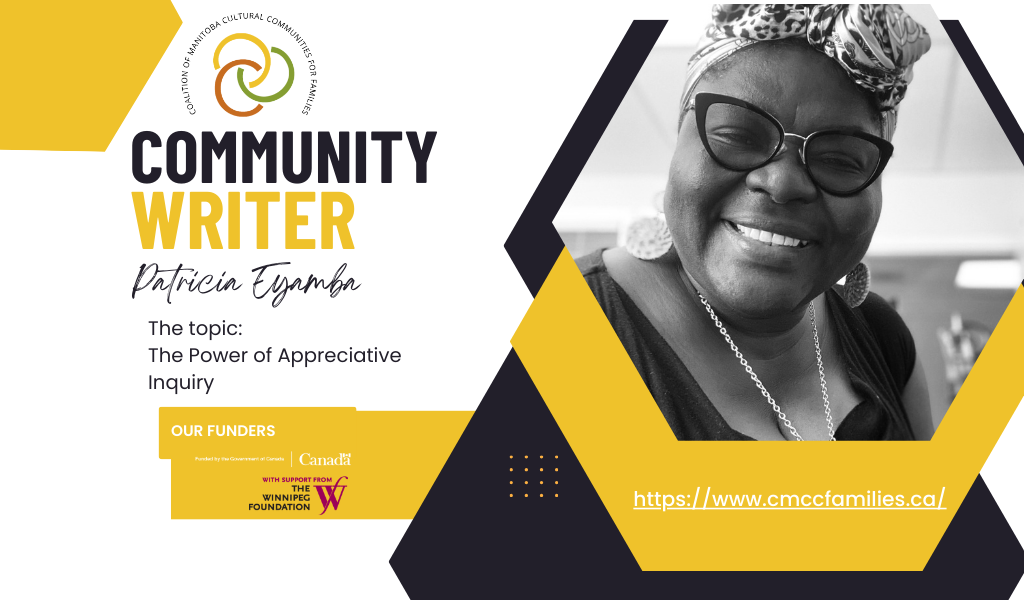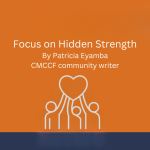
In the bustling months of July and August, my work at a Summer camp in Winnipeg, Canada, reaches its peak as we engage with immigrant families during the newcomer summer program. The 15-day camp, a melting pot of diverse tongues and tribes, welcomes immigrant children to a shared experience of joy and discovery. On a particular Wednesday, facilitators Renees and Mifun gathered children for a pep talk, setting the stage for another day of fun.
Amidst the excitement, a phone call from my friend Carola announced a potential volunteering opportunity with Martin Itzkow co-lead of the Coalition of Manitoba Cultural Communities for Families (CMCCF). A window of opportunity opened. Carola and I found each other attending an Ethnocultural workshop led by Martin and Steven. Famed for their influence on policy work using a Justice, Equity, Diversity and Inclusion (JEDI) lens, the duo coordinates CMCCF.
CMCCF collaborates with esteemed organizations such as the Manitoba Association of Newcomer Serving Organizations (MANSO), African Communities of Manitoba Inc. (ACOMI), The Ethnocultural Council of Manitoba (EECM), and The Manitoba Islamic Association (MIA). They work together, creating a template for conversation and collaboration, that weaves a narrative of inclusivity and shared destiny.
The workshop, held on October 7th/2023 at Shaw studio in Winnipeg, unfolded as a convergence of diverse cultures, fostering unity of purpose. The themes explored during the workshop included defining cultural communities inclusively, promoting cultural sensitivity, preserving identities, fostering integration, cultivating leadership skills, and enhancing well-being.
In a welcome remark, Martin announced the adoption of Appreciative Inquiry (AI) approach as the process for the workshop. He said the approach will help reveal hidden strengths within the community, creating a cultural symphony for envisioning a shared future. Also, the four-hour interactive workshop was guided by justice, equity, diversity, and inclusion principles.
Appreciative Inquiry (AI) is a “collaborative and strengths-based approach to organizational development and change management. It is a method of inquiry that focuses on identifying and leveraging an organization’s positive attributes, strengths, and successful experiences to create positive and sustainable change”. This approach was developed by David Cooperrider and Suresh Srivastva in the 1980s. Appreciative Inquiry is widely used in various settings, including business, non-profits, education, and community development, to bring about positive change, enhance organizational culture, and foster innovation.
In another presentation, Steve maintained that adopting Appreciative Inquiry approach would create a ripple effect of collaboration, showcasing the transformative power of positive energy. Earlier, Steve had informed participants that the commitment to these gathering stems from acknowledging historical exclusions, creating a rallying cry for communities to actively lead and participate in policy development and implementation that affects them.
The anticipated outcome is a framework for the future—an alliance of cultural communities collaborating with organizations, service providers, policymakers, government agencies, and private sector partners to design initiatives fostering healthy, inclusive communities. The emphasis is on collaboration—on leveraging the collective strength and diverse perspectives to bring about meaningful change. This studio production is more than a gathering; it’s a cultural symphony, bringing together diverse communities to envisage their shared future.
The evolution of the workshop witnessed a dialogue that explored vital themes—defining cultural communities inclusively, promoting cultural sensitivity and responsiveness, preserving cultural identities, fostering integration, cultivating leadership skills, and enhancing social and emotional well-being. These conversations were not just theoretical reflections; but were fundamental discussions, illuminating the issues that should help shape the future fabric of cultural communities in Manitoba.
Empowerment through capacity building took the limelight, envisioning cultural communities as catalysts for democratic principles, multiculturalism, and pluralism. The narrative underscored, not just challenges, but the transformative potential cultural communities hold in reshaping power dynamics between communities and institutions of government.
In summary, the narrative discussed the importance of dialogue, collaboration, and transformative thinking. It encourages participants to envision the future of their cultural communities, identify strengths, and build bridges with service providers and policymakers. Cultural communities can script a future where justice, equity, diversity, and inclusion are the guiding stars.
The workshop concluded with an open-ended question, inviting reflection on shaping the narrative, destiny, and future of Manitoba’s cultural communities. In my opinion, it emphasized using Appreciative Inquiry as a mainstream process, relying on collective imagination, collaboration, and the belief that cultural communities can script a common future. The event served as a beacon of hope, calling for support through a JEDI lens. The call to action is crystal clear “How can we support our cultural community through a JEDI lens?” This is the multi-million-dollar question that this process seeks to address.
On a personal level, once sceptical of change, stumbling on AI a second time – shifted my perspective in a profound way. It sparked self-discovery and renewed hope. I had been introduced to AI by Michael Simpson and Jenifer Castleden, my former Executive Director and Program Director respectively, years back in Nigeria, when I was co-leading the environmental project. For some reason, it didn’t make a significant impact then, I remember we used the process for asset mapping for natural resource dependent communities to determine their strength. From facilitators point, I didn’t have to do much of the thinking, but to keep probing. This time it was different, I assumed because we were the ones on the spot doing the thinking, reflecting and responding to the questions. At the end of the day, I couldn’t understand why the word AI kept echoing in my subconscious. I tried to subdue the small voice. The more I tried; the still small voice became stronger. The echo was not disturbing but ushered in some kind of feeling of satisfaction, satisfaction of discovering something very profound. The peace I experienced within was weird. Feeling like new, a rebirth, self-discovery.
Filled with gratitude, I researched further and encountered the 4-D Cycle, which explained to me and further illuminated my understanding of the AI process. The 4-D Cycle involves DISCOVERY…”what gives life?” within the organisation/community… DREAMS. “What might be?” … envisioning results/impact, DESIGN…”what should be the ideal…co-constructing….and DESTINY… “how to empower, learn and improvise”… sustaining. (See more about the AI process here)
AI sits well with my worldview, emphasizing the positive in people while understanding their imperfections.
The simple yet powerful principle of appreciating the best in everyone and everything became a guiding force. Focusing on what is right, creates a harmonious tapestry of strengths that empowers and foster a sense of unity within. By embracing positivity, I transformed challenges into opportunities. Rediscovering AI is an unexpected compass for my life journey.
![]()

This article was written by community writer Patricia Eyamba as part of our J.E.D.I. Initiative – Community Writers Project. All thoughts and opinions expressed are Patricia’s own.
To learn more about our Intercultural and Intergenerational Diversity and Inclusion Engagement Project, go to our J.E.D.I. Initiative landing page here.

 Previous Post
Previous Post Next Post
Next Post